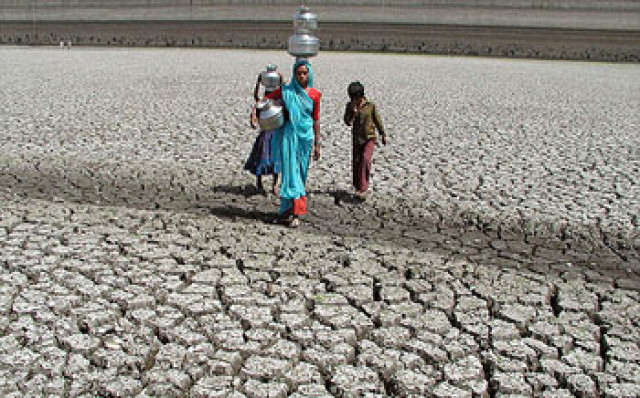Minorities ‘pay extra’: Rains for all, relief for some
Scheduled castes allege they’re discriminated against at relief camps.

Minorities ‘pay extra’: Rains for all, relief for some
The floods have wreaked havoc across Sindh but the most vulnerable of its people, the scheduled castes, have to pay an extra price.
Organisations conducting relief efforts, and not just the religious ones, have been discriminating against the scheduled castes, Mohan Kolhi, a community chief living near Khoski town, told The Express Tribune.
A religious organisation set up a relief camp in Khoski town but not a single bag was distributed to members from the scheduled caste community, he said. “When we visited the relief camp, the prayer leader of the mosque told us that the ration is only for Muslims,” said Kolhi, adding that they were not even allowed to drink water from fountains set up outside the camps.
“Sindh is our motherland and we have been living here for centuries,” he said. “So what if we are scheduled castes? We are also humans.”
Indebted, ruined
Sindh’s scheduled castes, including the Kolhis, Menghwars, Bheels and Oads, are predominantly employed as farmers in Badin district.
These Hindu farmers usually take loans from landlords and tend to the land with their families all year round to pay back. As such, they are most vulnerable to the devastating rains and ensuing floods.
“My landlord loaned Rs50,000 and I used it to plant cotton on 20 acres,” said Kolhi. “All my crops have been damaged. I don’t know how I will pay back my landlord,” he added.
Kirtar Lal Menghwar, an agricultural expert who works at the Laar Humanitarian and Development Program (LHDP) corroborated Kolhi’s account.
Organisations that have set up relief camps in towns are following in the footsteps of banned religious organisations and discriminating against minorities, he said. “They ignore the scheduled castes every time disaster strikes, whether it is cyclones, floods or heavy rains,” said Menghwar.
The 50,000 scheduled caste members living in different villages across Badin are facing similar problems, he added.
(Read: A view from Badin)
All’s not bleak, however. Sattar Zangejo, who is affiliated with a UK-based donor organisation Oxfam, said they have received directives to focus on vulnerable segments of society. These segments include non-Muslims and scheduled castes that have been ignored in the past.
Published in The Express Tribune, September 14th, 2011.



















COMMENTS
Comments are moderated and generally will be posted if they are on-topic and not abusive.
For more information, please see our Comments FAQ